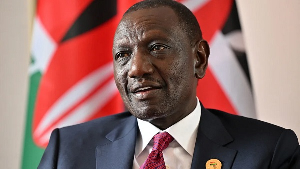Ghana’s trade surplus widened in the first half as an increase in revenue from gold exports limited the impact of a plunge in cocoa income.
The favorable trade gap grew 12.5% from a year ago to $1.8 billion, Bank of Ghana said in a summary of economic and financial data on its website. Total exports increased 13.6% to $9.2 billion, spurred by a 47% surge in revenue from gold shipments to $5 billion. Total imports rose to $7.4 billion from $6.5 billion.
A slump in cocoa production in the world’s second-biggest grower of the chocolate-making ingredient drove export revenue 48% lower to $760 million in the first six months. A combination of bad weather, disease and a shortage of fertilizer has curbed output in Ghana and top producer Ivory Coast.
Ghana’s harvest for the season that ends in September may total 501,000 tons from 654,000 tons a year earlier, the International Cocoa Organization forecasts.
Cocoa revenue drop has weighed on the performance of the cedi to the dollar this year. The local currency has weakened by 23% so far in 2024 compared with a depreciation of 10% for the same period in 2023.
Below are other key economic and financial indicators in the central bank report:
Oil exports in the first half rose 17% to $2 billion y/y.
Current account surplus widened to $1.3 billion from $863 million over the period; overall balance of payments improved to a surplus of $942 million from a deficit of $341 million.
Gross international reserves rose to $6.9 billion at end-June from $5.3 billion y/y.
Public debt increased to 742 billion cedis from 583 billion cedis.
Debt as a ratio of gross domestic product rose to 70.6% from 69.3%.
Banks’ loans grew to 84.5 billion cedis at the end of June from 73.1 billion cedis y/y.
Loans growth quickened slightly to 15.5% from 15.4%.
Capital adequacy rose to 14.3% from 14.2%
Non-performing loans increased to 24.1% from 18.7%.
Monthly mobile-money transactions totaled 224 billion cedis in June from 149.4 billion cedis in June 2023
Click to view details



Business News of Sunday, 28 July 2024
Source: bloomberg.com

















